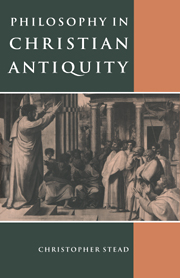Book contents
- Frontmatter
- Contents
- Preface
- List of abbreviations
- PART I THE PHILOSOPHICAL BACKGROUND
- 1 From the beginnings to Socrates
- 2 Socrates and the Platonic Forms
- 3 The philosophy of Plato's maturity
- 4 Aristotle
- 5 Epicurus and the Stoics
- 6 The Middle Platonists and Philo of Alexandria
- 7 The philosophy of late antiquity
- PART II THE USE OF PHILOSOPHY IN CHRISTIAN THEOLOGY
- PART III AUGUSTINE
- Bibliography
- Index of Names
- Index of Subjects
1 - From the beginnings to Socrates
Published online by Cambridge University Press: 29 September 2009
- Frontmatter
- Contents
- Preface
- List of abbreviations
- PART I THE PHILOSOPHICAL BACKGROUND
- 1 From the beginnings to Socrates
- 2 Socrates and the Platonic Forms
- 3 The philosophy of Plato's maturity
- 4 Aristotle
- 5 Epicurus and the Stoics
- 6 The Middle Platonists and Philo of Alexandria
- 7 The philosophy of late antiquity
- PART II THE USE OF PHILOSOPHY IN CHRISTIAN THEOLOGY
- PART III AUGUSTINE
- Bibliography
- Index of Names
- Index of Subjects
Summary
Philosophy was invented and given to the world by the Greeks. Although in some departments they drew on the experience of other nations (for instance, on Babylonian astronomy), it was the Greeks who developed philosophy into a wide complex of studies, which included the beginnings of what we now call natural science, and which was later to be summed up in the three headings of logic, ethics and physics. Physics was the name given to the study of the natural world and its explanatory principles; it therefore took in the question whether there are gods, or a single God, and whether the world was made, and is governed, by such beings. For those who believed in divine existence, theology was a branch of physics.
The Greek philosophers broke new ground through their ability to ask abstract and wide-ranging questions. Before their time, much common-sense observation was embodied in the working knowledge of sailors, farmers and builders, or expressed in proverbial sayings about human conduct. But for the large general questions about the world men had to resort to a primitive mythology which associated each of the main components of the world with a particular divine being; the heavens with Zeus, the sea with Poseidon, and so on. A philosophy recognizably distinct from mythology began when the sages of Miletus, in Asia Minor, attempted to explain the world in terms of inanimate things which could be expected to behave in a regular way in accordance with a few simple laws.
- Type
- Chapter
- Information
- Philosophy in Christian Antiquity , pp. 3 - 13Publisher: Cambridge University PressPrint publication year: 1994

